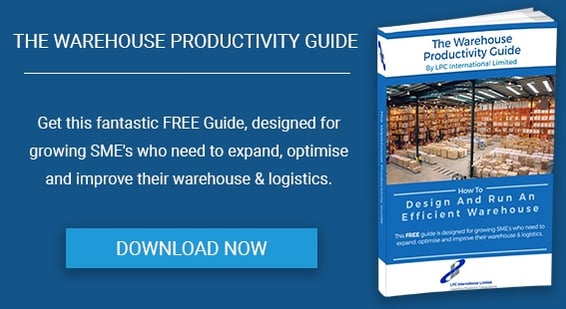
In the retail industry, effective warehouse management involves squeezing the maximum advantage from all the space you have available in your warehouse or distribution facility. Every square foot of space should be assessed in terms of its productive potential and the monetary return that comes from it. Wasted or poorly used floor or cubic space is an unproductive asset that is, in effect, costing you money.
Here is why space matters in your retail warehouse.
How much space?
Your warehouse should include just enough space to accommodate your stock to support your required rate of stock turn. Too little space and your supply chain suffers by increasing your order processing time, thus losing you money and leading to supply issues in your shops. Having too much warehouse space also costs you money as it adds to fixed distribution costs. The correct use of space reduces your variable costs, as it can optimise journey distances for picking etc and improve the efficiency of your warehouse. However this has to be balanced against the increased requirements on space that growth, being positive, will demand over the planning horizon of the facility. Learn more about how to save space with this great article - 4 Best Warehousing Practices To Increase Storage Space.
Optimise / maximise stock turns to avoid overstocking and to allow space for active SKUs
In years past, it was common for vast retail warehouses to be packed to the rafters with stock. However, conventional wisdom has now changed. Rather than maximising your stock holding, it is better to aim to increase your stock turnover. This means avoiding overstocking. There are sound reasons for doing this, including avoiding capital tied up in stock, obsolescence and spoilage, as well as reducing the risk of damage. It also allows a more dynamic use of space, making smaller distribution centres more productive and profitable. In addition, a carefully managed capacity allows space to receive and despatch in and carry out put away and replenishment activities efficiently. This is more difficult to do in a warehouse that is full to capacity
Order picking and load preparation allows for faster turnaround of transport
Without the pressure of having to use all available space for storage, you now have the freedom to design adequate goods in, picking and dispatch areas. These take up more space, but significantly improve your warehouse operation by allowing a more rapid turnaround of stock. The number and volume of SKUs processed in the course of a set period is therefore greater than large stock holdings with a lesser stock turn due to more efficient processing space being provided.
Arrange your stock for effective pick management
The way your stock is arranged for effective picking is important for a number of reasons. Firstly, stock damage in the warehouse is a significant issue for retail businesses. This can be minimised through a pick layout that allows heavy items to be picked first, with lighter items stored on top. In so far as possible you should avoid having to pick heavy items from height. Consideration should also be given to where you place your most popular product lines. As these will have the highest turnover, they should be positioned, and sized, where they can easily be accessed, picked and replenished. This may well be further complicated by a need to pick in a “store friendly” fashion.
To make the most of your retail warehouse, your space layout should be designed to serve the needs of your business. Depending on the sector you trade in, there will be additional considerations. For instance, for food retailers, warehouse management should take into account rapid turnover of perishable goods, and the safe storage of delicate items. Other products may require temperature - controlled areas, which should be factored into your overall plan.


